------------
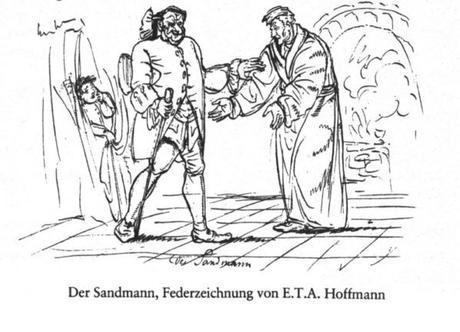
Si recordáis, en la primera parte había dicho que quedaba por desvelar cuál era el enigma bajo el nombre de Coppelius, y por qué es el Hombre de Arena de Nathaniel. Siendo sincera, puede que su identidad no cause mucha emoción, entre otras cosas porque se sabe casi al principio de la historia, y porque el personaje físico en sí solo aparece en ese momento clave, luego pasa a formar parte de la obsesión de Nathaniel. En todo caso, y si queréis saberlo por vosotros mismos sin spoilers, os recomiendo no leer los dos siguientes párrafos. El pequeño Nathaniel, llevado por las ansias de saber quién era esa figura sin rostro que tanto le atemorizaba, se esconde en la habitación de su padre para descubrir que el Hombre de Arena es el abogado de su progenitor, de nombre Coppelius. ¡Pues claro! 2 + 2 son... ¿cinco? La relación que hace el niño es ilógica y la vez no lo es. Es ilógica, porque al despacho de su padre podría haber entrado cualquier persona, con lo cual, hasta su propio padre podría haber sido ese Hombre de Arena si la imaginación del niño así lo dicta. Y digo que así lo dicta, porque Nathaniel no solo descubre la identidad de lo que tanto miedo le producía, sino que además observa que tanto Coppelius como su padre practican la alquimia en el mismo despacho de su progenitor. La cosa se complica aún más cuando Coppelius dice necesitar ojos (presumiblemente para una de las fórmulas), y oportunamente descubren al chico, que ha caído al suelo desmayado. En esta parte, es decisión del lector tomarlo como parte de la imaginación del asustado niño. Hay que recordar además que la alquimia se veía como un arte para charlatanes y brujos, aunque ésta fuera predecesora de la ciencia moderna, y sumado todo ello a la trascendencia que estaba tomando la ciencia por encima de la fe religiosa durante el siglo XIX, no es de extrañar que el papel de malo de la historia se la lleve el que hace alquimia. He dado algunas razones de por qué el miedo de Nathaniel a Coppelius puede parecer ilógico, ¿pero en realidad tienen fundamento sus temores? Nathaniel tiene muy claro que el enemigo está en casa. De hecho, su sorpresa al saber que el abogado Coppelius es el Hombre de Arena, aumenta en cuanto se da cuenta de que ese hombre ha comido incluso en su casa. Creo que esto muestra una perspectiva bastante interesante sobre cómo percibimos las amenazas. Pensamos que el mayor peligro siempre vendrá de fuera, de algo que no conocemos, y ni nos paramos a pensar que a lo mejor lo que más daño nos puede hacer es lo que más cerca está de nosotros. Nathaniel ya había visto en otras ocasiones a Coppelius sin sospechar de él, y en cuanto cree descubrir la verdad sobre el abogado, dice que ni la figura más abominable le hubiera causado tanto terror como la suya.
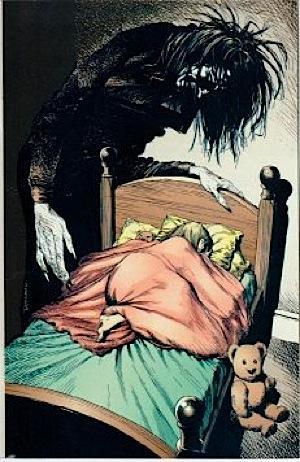
Si tenemos miedo incluso dentro de nuestro propio hogar, quizá es porque la amenaza viene de dentro y no de fuera
¿Y qué es lo que ha pasado con el Nathaniel adulto? Otro nombre va a resumirlo todo: Olimpia. Olimpia no es una mujer cualquiera, es una autómata fabricada por el profesor de Nathaniel, de la que se enamora sin ni siquiera saber que ella no es real. Pareciera que estamos ante un avance de ¿Sueñan los androides con ovejas eléctricas? Lo que está claro es que todo parece girar en torno a la dificultad para distinguir entre lo real y lo irreal, y la clara influencia de la ciencia más moderna. En la entrada sobre Frankenstein encontraréis mucha información respecto a este último punto, ya que es una novela que también pertenece al siglo XIX y que habla de los estragos que la ciencia estaba creando en el mundo. Para no extenderme demasiado con la historia que hay detrás del amor del protagonista por Olimpia, utilizaré una cita del relato: "La figura de Olimpia se multiplicaba a su alrededor como por encanto; veíala flotar por los aires como una nube de nieve, brillar a través de las cercas floridas, y reproducirse en los cristalinos arroyuelos".
Nathaniel está tan obsesionado con esta androide que creer verla en todos lados, exactamente igual que con Coppelius, al que cree reconocer incluso en un vendedor de barómetros. Por el tratamiento que Hoffmann le da a Olimpia como el nuevo fantasma que persigue a Nathaniel a todos lados, parece querer dar la impresión de que la autómata se ha convertido en el nuevo Coppelius, o lo que es peor (o mejor), es posible que su fijación con ella se debe al hecho de que le recuerda a Coppelius. Porque es enigmática, porque la ve en todos lados, porque no sabe si es real, porque en el fondo tiene miedo aunque la ame. Si en algún punto puedo encajar la teoría del miedo a la castración de Freud, es en esta parte.
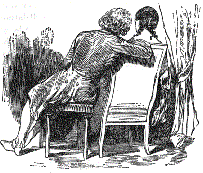
¿Por qué Nathaniel se enamora de algo que le recuerda a su mayor terror?
El Hombre de Arena ha hecho sentir vulnerable a Nathaniel toda la vida, le hace sentir como ese niño indefenso que busca la protección de su madre; en otras palabras, sentir que no es fuerte le hace sentir castrado. Pero con Olimpia tiene una nueva oportunidad, porque por primera vez puede intercambiar esa posición. Ella no se impondrá ante él, respetará su lugar como cabeza de familia, le hará sentirse seguro y poderoso; resumiendo, con Olimpia recupera la fortaleza y la virilidad que una vez le fueron robadas. Olimpia es un Hombre de Arena al que esta vez va a vencer.Seguramente, si buscáis el cuento de Hoffmann en relación al temor a la castración, encontraréis respuestas que tienen que ver mucho más con el aspecto físico, como la amenaza de que el Hombre de Arena le saque los ojos, como anteriormente comenté. Sin embargo, en un sentido mucho más íntimo, este terror a la castración supone más un miedo a perder poder tanto en la sociedad como en las relaciones personales. Para concluir, es importante destacar que Hoffmann deja entrever a lo largo de toda la historia, que muchas de las cosas que suceden no son reales, y son fruto de la imaginación de Nathaniel. Incluso la misma Olimpia pudo ser una alucinación de la mente cada vez más inestable de su mente. Y ya se sabe que el mayor terror que existía en el siglo XIX, era volverse loco.
Audiolibro: Coppelius (El Hombre de Arena), de E.T.A.Hoffmann
Cortometraje animado: El Hombre de Arena
Cortometraje animado: El Hombre de Arena
Serie: El Quinto Jinete - Coppelius
Trailer: El hombre de arena (subtítulos en inglés)
Radio: La Rosa de los Vientos - Enigmas Literarios
Opera: Les Contes d'Hoffmann - C'est moi, Coppélius
No olvidéis que podéis ver todos los vídeos del blog aquí:
https://www.youtube.com/channel/UCOq0hbMiz_IBW6kIClelOAQ
Todos los comentarios son bienvenidos.
Fuente de las imágenes:
https://beautyisasleepingcat.wordpress.com/2010/09/19/e-t-a-hoffmann-the-sandman-aka-der-sandmann-1816/
http://germanculture.com.ua/famous-germans/wilhelm-hoffmann/-----------
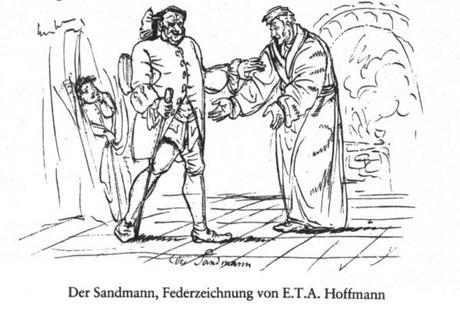
If you remember, I had said in the last part that it remained to know what was the mistery under the name of Coppelius, and why he's Nathaniel's Sandman. Being honest, his identity may cause no excitement because, among other things, that's solved almost at the beginning of the story, and because the character physically appears just at that special moment, then he becomes part of Nathaniel's imagination. In any case, if you want to dicover it by yourselves without spoilers, I warn you to not read the next two paragraphs. Little Nathaniel, carried away by the anxiety to know who is that figure without face who scared him so much, hides himself inside his father's room to discover that the Sandman is his lawyer, whose name is Coppelius. Of course! 2 + 2 equals... five? The connection that the kid made is ilogic but at the same time is not. It's ilogic because anyone could have entered inside his father's office, so even his father could have been the Sandman if Nathaniel's imagination says so. And I say that because the kid not only discovers the identity of what scared him, but he also sees that both Coppelius and his father practice alchemy in his father's office. Things got complicated when Coppelius says that he needs eyes (for one of the formulas apparently), and they opportunely find the boy who has fell to the floor unconscious. At this part, is the choice of the reader to consider it as part of the kid's imagination. We have to remember that alchemy was regarded as an art for quacks and sorcerers, although it preceded modern science, and taking into account the major role of science over religious faith during the XIX century, then it's not so strange that the bad guy is the one who practises alchemy. I gave some reasons to explain why Nathaniel's fear to Coppelius may seem ilogic, but are his fears unfounded? Nathaniel knows well that the enemy is at home. In fact, the shock of knowing that Coppelius the lawyer is the Sandman increases once he realises that that man has even took the luch in his own home. I think this is a very interesting perspective that tells us how we perceive threats. We believe that the worst danger always comes from outside, from something we ignore, and we don't even stop to think that maybe what could hurt us the most is what is closer to us. Nathaniel had already seen Coppelius in other occasions without suspect him, and once he thought he has discovered the truth about the lawyer, he says that not even the most horrendous figure would have caused to him so much terror like he does.
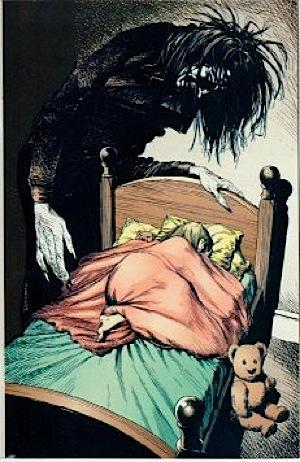
If we are scared even at home, maybe it's because the threat comes from the inside rather than the outise
And what happened with the adult Nathaniel? Another name is going to summarize that: Olympia. She's not a woman like any other, she's an automaton created by Nathaniel's teacher, and he falls in love with her without even know she's not real. It seems this is a preview of Do androids dream of electric sheep? What it's clear is that everything seems to be focused on the difficulty to differentiate between what is real and what is not, and the big influence of modern science. In the entry about Frankenstein you will find information regarding this last point, because it's a novel that belongs to the XIX century as well and it talks about the effects that science was producing all over the world. To not go on too long explaining the story behind the love that the main character feels towards Olympia, I just will use a quotation from the story: "Olympia's image hovered about his path in the air and stepped forth out of the bushes, and peeped up at him with large and lustrous eyes from the bright surface of the brook".
Nathaniel is so obssesed wiht this android that he sees her everywhere, exactly like Coppelius, to whom he believes to recognize even in a barometers's seller. Due to the treatment that Hoffmann gives to Olympia as the new ghost who goes after Nathaniel everywhere, it seems that she has became into the new Coppelius, or what's worst (or best) it could be possible that his obsession with her is because she reminds him Coppelius. Because she's enigmatic, because he sees her everywhere, because he does not know if she's real, because after all he's afraid of her although he loves her. If I can understand the castration theory by Freud is at this part.
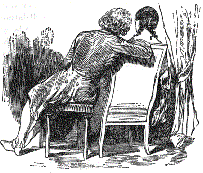
Why Nathaniel is in love with what reminds him his biggest fear?
The Sandman has made him feel vulnerable all his life, he makes him feel like a defenseless child who looks for his mother protection; in other words, to feel not strong makes him feel castrated. But he has a new chance with Olympia, because for the first time he can exchange that position. She will not command him, she will respect his role as the head of the family and she will make him feel self- confident and powerful; in short, thanks to Olympia he will recover the strenght and manhood which were stolen from him once. Olympia is a Sandman that he's going to defeat. Probably, if you search this story regarding the fear of castration, you will find answers which have to do with physical fear, like the threat of the Sandman gouging out his eyes, as I said before. However, in a more intimate sense, the fear to castration suggests a fear to lose power both within society and personal relationships. To conclude, it's important to remark that Hoffmann lets us think along the story that many things that occur are not real and they are part of Nathaniel's imagination. Even Olympia herself may be an hallucination from his volatile mind. And it's well known that the biggest fear during the XIX century was to lose one's mind.
Audiobook: Coppelius (The Sandman), by E.T.A.Hoffmann
Short animated film: The Sandman
Trailer: The Sandman (English subtitles)
Opera: Les Contes d'Hoffmann - C'est moi, Coppelius
Don't forget you can watch all the videos from the blog here:
https://www.youtube.com/channel/UCOq0hbMiz_IBW6kIClelOAQ
All comments are welcome.
Images source:
https://beautyisasleepingcat.wordpress.com/2010/09/19/e-t-a-hoffmann-the-sandman-aka-der-sandmann-1816/
http://germanculture.com.ua/famous-germans/wilhelm-hoffmann/
http://germanstories.vcu.edu/hoffmann/sand_e_pics.html------------

